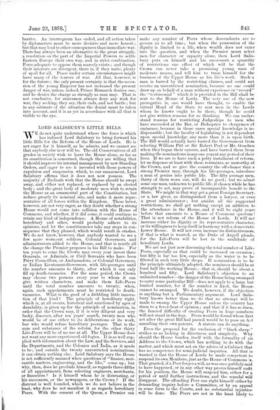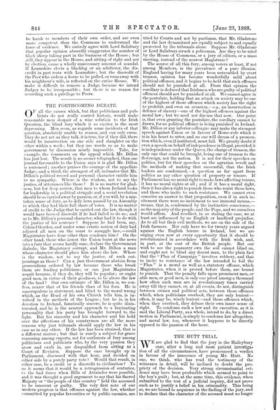LORD SALISBURY'S LITTLE BILLS.
WE do not quite understand where the force is which has induced Lord Salisbury to bring forward his little Bills for the Reform of the House of Lords. He is not eager for it himself, as he admits, and we cannot see that anybody else is or will be. The old Conservatives of all grades in society wish to leave the House alone, as far as its constitution is concerned, though they are willing that it should improve its internal management by new Standing Orders, and eager to see it invested with those powers of expulsion and suspension which, to our amazement, Lord Salisbury affirms that it does not now possess. The majority of Radicals wish that the House should be swept away, and either not replaced, or replaced by an elected body ; and the great body of moderate men wish to retain the House as an ornamental part of the Constitution, but reduce greatly its nominal size, and make it more repre- sentative of all forces within the Kingdom. These latter, however, are not very eager, as they doubt whether a strong House would not come into collision with the House of Commons, and whether, if it did come, it could continue to retain any kind of independence. A House of notabilities, hereditary and other, would probably adhere to its opinions, and let the constituencies take any steps in con- sequence that they pleased, which would result in crashes. We do not know, however, that anybody wanted to see a few more worn-out soldiers, Colonial Governors, and administrators added to the House, and that is nearly all the change the Premier proposes in his Bill to make. For ten years to come the Crown may every year invest three Generals, or Admirals, or Civil Servants who have been Privy Councillors, or Ambassadors, or Colonial Governors, or Indian Lieutenant-Governors, with life-peerages until the number amounts to thirty, after which it can only fill up death-vacancies. For the same period, the Crown may choose two persons every year to whom it can give written characters, and make them Life-Peers until the total number amounts to twenty, when, again, such appointments must he restricted to death- vacancies. What is the good of a dribbling little innova- tion of that kind ? The principle of hereditary right, which is, at all events, historical and sanctioned by ages of durability, is given up for the principle of nomination, in order that the Crown may, if it is very diligent and very lucky, discover, after ten years' search, twenty men who would be of use either to its deliberations or its work, but who would refuse hereditary peerages. That is the sum and substance of the reform, for the other thirty Life-Peers will be of no use at all. The Upper House does not want any more experienced old fogies. It is as well sup- plied with information about the Law, and the Services, and the Departments, and the Colonies and India, as it needs to be ; and outside the twenty unrestricted nominations, it can obtain nothing else. Lord Salisbury says the House is not sufficiently manned when questions of "finance, mer- cantile matters, engineering, and the like," come up ; but why, then, does he preclude himself, as regards three-fifths of all appointments, from selecting engineers, merchants, or financiers ? Is it himself whom he is distrusting, or his successors, or the newspapers, or the Crown ? If the distrust is well founded, which we do not believe in the least, why does he not manifest it as regards hereditary Peers. With the consent of the Queen, a Premier can make any number of Peers whose descendants are to govern us to all time ; but when the possession of the dignity is limited to a life, when wealth does not enter into the question, and when the Premier must select men for character or capacity alone, then Lord Salis- bury puts on himself and his successors a quantity of restrictions one effect of which will be that the Crown can never take a promising young man of moderate means, and tell him to train himself for the business of the Upper House as his life's work. Such a man is barred by the restricting clauses, and could not receive an unrestricted nomination, because no one conk/ draw up on behalf of a man without experience or "record" the "testimonial" which it is provided in the Bill shall be sent to the House of Lords. The very use of the new prerogative is, one would have thought, to enable the virtual Head of the State to seat men in the Lords whom he knows ought to be there, though he could not give written reasons for so thinking. We can under- stand reasons for restricting Judgeships to men who have succeeded at the Bar, or Bishoprics to clergymen of eminence, because in those cases special knowledge is in- dispensable ; but the faculty of legislating is not dependent upon special knowledge any more than it is upon birth. The Bill would actually have barred the Government from selecting William Pitt or Sir Robert Peel or Mr. Goschen when they began their careers, and have barred them from making the nominations in any one year at any period of their lives. If we are to have such a petty instalment of reform, let us dispense at least with these restraints, so unworthy of the Crown, and so give the country the off-chance that a strong Premier may, through his life-peerages, introduce a man of genius into public life. The fifty average men, thirty of them worn out, will do no good ; but we admit some one man, unknown to public life, if chosen while he has strength to act, may prove of incomparable benefit to the State. We might in that way get a great Foreign Secretary, or a law giver, as distinguished from a lawyer, or even a great administrator ; but amidst all the suggested restrictions, we shall get nothing except an addition to the attendance in the House, and it will be eight years before that amounts to a House of Commons quorum ! That is not reform of the House of Lords. It will not increase either its dignity or its representative character, or its willingness to keep itself in harmony with a democratic Lower II ouse. It will not even increase its distinctiveness, if that is what is wanted, as the Duke of Argyll pleads, for the Life-Peers will be lost in the multitude of hereditary Lords.
We are not just now discussing the total number of Life- Peers, especially as that could be increased on occasion ; but fifty is far too few, especially as the water is to be filtered in such very little drops. If nomination is to be the principle ultimately adopted, the nominees should be at least half the working House,—that is, should be about a hundred and fifty. Lord Salisbury's objection to an unlimited number—the danger of the House being swamped to carry some particular Bill—does not apply to a large but limited number, for if the number is fixed, the House cannot be swamped. We doubt, however, if the objection is anything but a Parliamentary argument. Lord Salis- bury knows better than we do that no attempt will be made to swamp the Upper House unless the country has risen to a fever-heat of opinion ; and that if it has so risen, the fancied difficulty of creating Peers in huge numbers will not stand in the way. Peers would be found whose first act after the great Bill had passed would be to pass an Act annulling their own patents. A statute can do anything.
Even the proposal for the exclusion of "black sheep" strikes us as lacking in directness and simplicity. Why should the House burden itself with the formality of an Address to the Crown, which has nothing to do with the matter, and which must act on the advice of a Cabinet that has no competence for semi-judicial inquiries. All that is wanted is that the House of Lords be made competent to suspend its own Members, just as the House of Commons :a. That granted, if a Peer forges a will, as was once publicly said to have happened, or in any other way proves himself unfit for his position, the House will suspend him, either for a. period or until further instructions, and the scandal will disappear. The offending Peer can right himself either by demanding inquiry before a Committee, or by an appeal in some form to the Courts, and no substantial injustice will be done. The Peers are not in the least likely to be harsh to members of their own order, and are even more competent than the Commons to understand the force of evidence. We entirely agree with Lord Salisbury that popular opinion absurdly exaggerates the number of black sheep taking part in the business of the House ; but still, they appear in the House, and sitting of right and not by election, cause a wholly unnecessary amount of scandal. If Loamshire elects a blackleg or an adulterer, the dis- credit in part rests with Loamshire ; but the discredit of the Peer who orders a horse to be pulled, or runs away with his neighbour's wife, is reflected on the entire House. We make it difficult to remove a Judge, because we intend Judges to be irresponsible ; but there is no reason for according such a privilege to Peers.







































 Previous page
Previous page